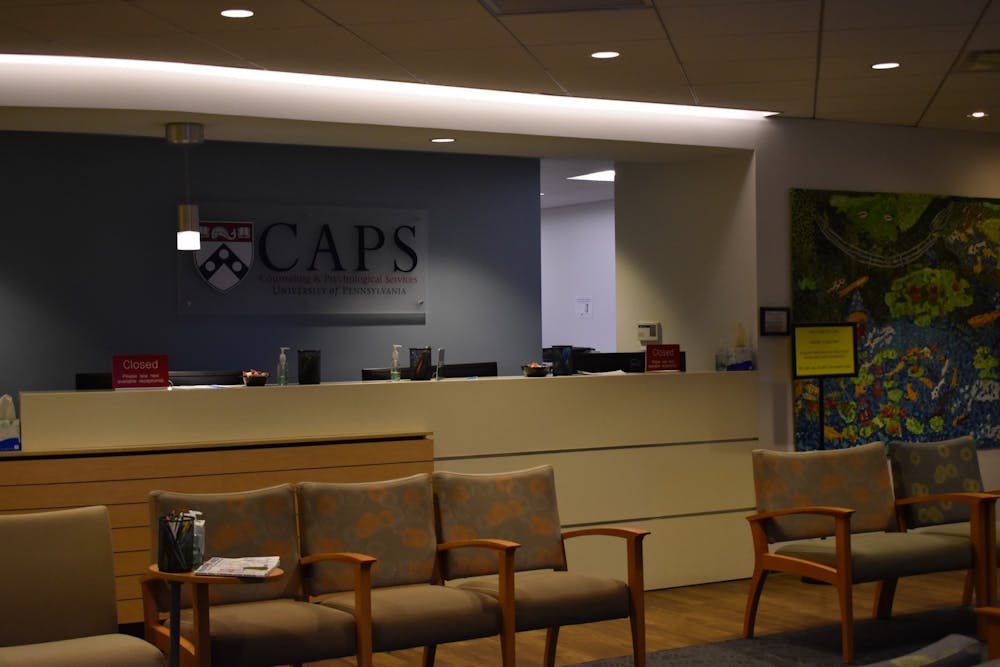In a recent Daily Pennsylvanian article, students reported month-long waits to meet with a Counseling and Psychological Services counselor. Especially for people calling CAPS for the first time, this long wait time is what one student called the “most discouraging thing in the world.” Chief Wellness Officer Benoit Dubé suggested that students take greater advantage of CAPS walk-in services (like walk-in hours and Let’s Talk), but many students aren’t aware of these services. Walk-in hours (and most other CAPS services) are distant from the heart of campus, as CAPS' office is on Market Street. Let’s Talk brings counselors to common student gathering places, but the hours and locations change depending on the day of the week, making it difficult for students to know where and when they can get immediate help.
While the services CAPS provides are still incredibly helpful, one thing is abundantly clear: CAPS is long overdue for an upgrade. Here are the two most pressing issues that need to be: One, CAPS must be centrally located on campus; two, the resources that CAPS has at its disposal must be increased. Namely, more personnel should be hired so that CAPS can offer services to a greater number of people in a greater number of locations more quickly.
Penn certainly has the resources to make this change happen. In the fiscal year 2021, Penn’s endowment rose a record 41.1%, and it currently stands somewhere close to $20.5 billion. Moreover, Penn has been embarking on a number of renovation and construction projects, including the recently built New College House West and Pavilion, in addition to future projects, like the Quad/Stouffer renovations and Amy Gutmann Hall. Certainly, many of these projects were funded by donations from alumni that were specifically earmarked for that purpose. But these building projects demonstrate the power of Penn’s alumni network (and wallet) and show that if Penn were as concerned with student mental health as it claims to be, it could move the mountains necessary to give CAPS the vital improvements that it needs.
Why is it vital that CAPS be moved to a more central location? For one, the structure of a university’s campus is revealing of what that university values. Locust Walk lies at the heart of Penn’s campus, and yet it is dominated by fraternities, exclusionary spaces characterized by wealth and privilege, and spaces where numerous Penn students have been physically or sexually assaulted. Students should feel at ease on Locust Walk, not reminded of their past trauma or how they don’t belong. By moving CAPS to a location on Locust, it would allow Penn to actually follow through on its voiced commitment to student mental health. And it would make CAPS far more accessible to students, wherever they live on campus. Currently, CAPS is a 12-minute walk from the Quad, a 12-minute walk from the high rises and New College House West, and a 10-minute walk from Hill. A central campus location would significantly cut down these travel times, or allow students to easily access walk-in hours on their way to or from class.
But even as Penn works to move CAPS to a more central location, immediate needs can be met by increasing the number of personnel on their payroll. For one, this would allow Penn to address the concerns we initially raised about Let’s Talk — therapists could be stationed in popular campus locations permanently and offer services for a greater number of hours. This would not only increase student access to vital services, but it would also address the appearance that Penn favors certain undergraduate and graduate schools more than others. For another, students who have identity-related preferences regarding the therapist with whom they meet experience longer wait times. Students should not have to choose between having culturally competent care and having any mental health care at all. By hiring more therapists from more diverse backgrounds, students’ identity preferences could be met without significantly increasing wait-times. And with more mental health professionals available, CAPS would be able to offer a greater variety of mental health services, such as more group-therapy sessions that could meet to address a wider variety of experiences.
Penn’s campus is one that is forever under construction: Year after year, Penn invests in new research and academic buildings, dorms, and other amenities. With the amount of resources at Penn’s disposal, there is no excuse for Penn not to invest in the mental health of its students and provide the vital upgrades that CAPS needs to adequately provide services to students.
Editorials represent the majority view of members of The Daily Pennsylvanian, Inc. Editorial Board, which meets regularly to discuss issues relevant to Penn's campus. Participants in these meetings are not involved in the reporting of articles on related topics.
SEE MORE FROM THE DAILY PENNSYLVANIAN EDITORIAL BOARD:
SEE MORE FROM THE DAILY PENNSYLVANIAN EDITORIAL BOARD:









